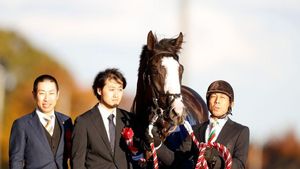Elon Musk has recently made headlines for his support of Germany's far-right political party, the Alternative for Germany (AfD), highlighting concerns about the impact of his endorsements on the democratic fabric of Europe.
During a virtual speech on January 27, 2025, at an AfD campaign event, Musk told approximately 4,500 party supporters, "It's good to be proud of German culture, German values, and not to lose those to multiculturalism." This statement, emphasizing nationalism, has raised eyebrows as Musk continues to assert his influence over political discourse.
Musk's involvement with the AfD aligns with its staunch anti-immigration and eurosceptic agenda. Founded in 2013, the AfD was initially regarded as fringe but grew significantly following the 2015 refugee crisis. Political science professor Kai Arzheimer of the University of Mainz pointed out, "The AfD is quite extreme even by European far-right standards," noting its increasing isolation from mainstream politics due to its extremist affiliations.
What makes Musk's endorsement particularly alarming is the party's documented extremism. The AfD has had members expelled for using Nazi slogans and is under constant surveillance by Germany’s domestic intelligence agency for extremism. Despite this, Musk has framed the AfD as "the best hope for Germany," based on its promises of "controlled immigration" and limited government regulation.
His remarks last month followed previous endorsements, first expressed via social media, when he stated, "I'm very excited for the AfD. I think you're really the best hope for Germany," during the same address with leading party figure Alice Weidel. This has transformed the AfD's visibility, drawing attention on global platforms.
With national elections looming on February 23, 2025, Musk's influence could be pivotal. Polls suggest the AfD could secure as much as 20% of the vote, creating fears among observers about its growing normalization. Mainstream parties have largely shunned cooperation with the AfD, which might leave the party both popular and politically isolated.
Elon Musk’s reach extends far beyond his tech empires. Critics like Thomas Zittel, politics professor at Goethe University Frankfurt, argue he embodies rising populism as he taps directly from the fountain of far-right rhetoric, bringing discussions usually relegated to dark corners of the internet to the forefront of mainstream conversation.
Under Musk's stewardship, the platform X has also seen alarming increases in extremist content. According to the Institute for Strategic Dialogue, antisemitic posts doubled after Musk's acquisition of the platform, with data indicating new accounts have tripled hate speech activity. This reality raises serious questions about the future of free speech versus the proliferation of hate speech.
"He has this control over social media. He has a lot of money. He has a huge factory in Germany," Arzheimer warns, illustrating Musk’s immense influence on discourse and political dynamics. This dynamic complicates Germany's carefully negotiated post-war democracy, which has sought to mitigate the resurgence of such far-right sentiments.
For Musk, it might be political strategy, or perhaps he genuinely aligns with the AfD’s platform. His past comments included inflammatory statements against German Chancellor Olaf Scholz as "an incompetent fool," which echo sentiments often found among far-right supporters. His actions may resonate with like-minded voters; after all, he has positioned himself as both entrepreneur and political provocateur.
Yet, analysts warn this kind of support may push the AfD back toward political isolation rather than solidifying its status. The party has been implicated with various right-wing extremists, with claims of fostering dangerous associations. Arzheimer notes, "Many people were not surprised to see Musk acting this way at the Trump inauguration," referring to his previous missteps perceived as fascist gestures during political gatherings.
Germany has worked relentlessly to reckon with its Nazi past, and Musk's amplification of the AfD risks unraveling decades of progress against extremist ideologies. The cheerleading for an openly extremist party by such influential figures potentially fuels erratic reactions leading to polarization around democratic values.
Many remain concerned about where this leads. Is Musk packaging far-right ideologies for mainstream consumption under the guise of free speech? Time will tell, but what is evident is the delicate balance of democracy is tipping as new voices, and powerful figures provoke debates surrounding national identity and cultural values.
While Musk claims to promote free speech, the reality may reflect another arena where truth becomes distorted, rendering political dialogue as mere spectacle. The consequences of this will be felt, not just in Germany, but across Europe and beyond, as the struggle against nationalism and extremism intensifies.



